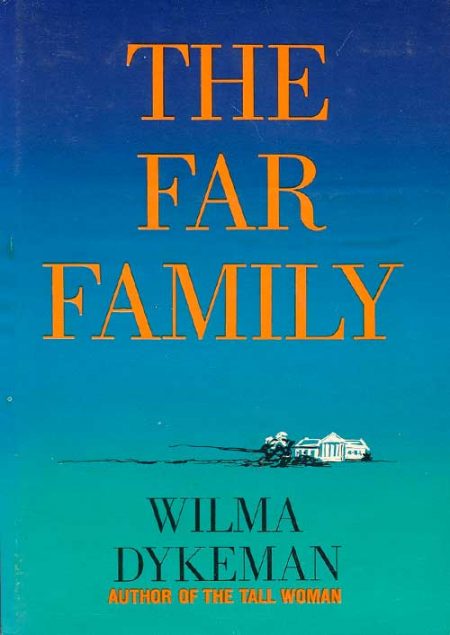-
 Lauren Gabriel spent many years of her childhood in foster homes, wishing her mother would come back for her and be the family she needs. Now twenty-years-old, she still longs for a place that she can truly call home. Her work as a cashier is unfulfilling, and at Christmas it’s unbearable with the songs and carols and chatter of Christmas that she hears throughout the day. By Donna VanLiere
Lauren Gabriel spent many years of her childhood in foster homes, wishing her mother would come back for her and be the family she needs. Now twenty-years-old, she still longs for a place that she can truly call home. Her work as a cashier is unfulfilling, and at Christmas it’s unbearable with the songs and carols and chatter of Christmas that she hears throughout the day. By Donna VanLiere -
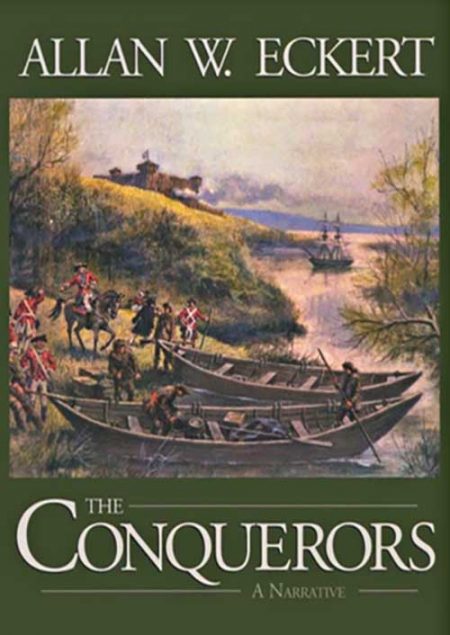 The Winning of America Series: Book 3 of 6 The Conquerors, the third volume in Allan Eckert's acclaimed series, The Winning of America, continues the narrative of The Frontiersmen and Wilderness Empire: the violent and monumental story of the wresting of the North American continent from the Indians. But the locale has moved westward—to the northern frontiers of Pennsylvania, to Michigan and the Green Bay area, especially the crucial outposts of Fort Pitt and Fort Detroit, Sandusky and Mackinac. SOFTBACK & HARDBACK By Allan Eckert
The Winning of America Series: Book 3 of 6 The Conquerors, the third volume in Allan Eckert's acclaimed series, The Winning of America, continues the narrative of The Frontiersmen and Wilderness Empire: the violent and monumental story of the wresting of the North American continent from the Indians. But the locale has moved westward—to the northern frontiers of Pennsylvania, to Michigan and the Green Bay area, especially the crucial outposts of Fort Pitt and Fort Detroit, Sandusky and Mackinac. SOFTBACK & HARDBACK By Allan Eckert -
Out of stock
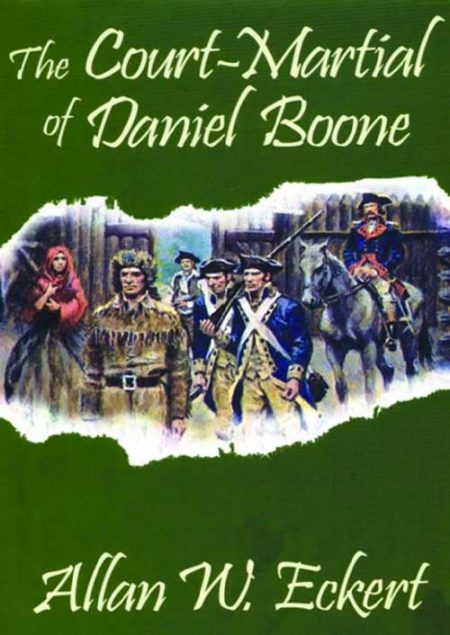 This young adult historical novel is based on an exciting and little known incident in the life of the famed Kentucky frontiersman Daniel Boone when, after being captured by Shawnee Indians and subsequently adopted into their tribe, he then escapes and returns to Boonesboro, only to find himself charged with treason and court-martialed. In a brilliant display of ability, Boone defends himself at the trial and gradually the truth about what really happened emerges. A fascinating glimpse of Kentucky's pioneer period as well as a penetrating look at frontier courtroom justice. By Allan Eckert
This young adult historical novel is based on an exciting and little known incident in the life of the famed Kentucky frontiersman Daniel Boone when, after being captured by Shawnee Indians and subsequently adopted into their tribe, he then escapes and returns to Boonesboro, only to find himself charged with treason and court-martialed. In a brilliant display of ability, Boone defends himself at the trial and gradually the truth about what really happened emerges. A fascinating glimpse of Kentucky's pioneer period as well as a penetrating look at frontier courtroom justice. By Allan Eckert -
 The Enduring Hills was the first of many novels Janice Holt Giles wrote in her lifetime. Based in part on her own experience with the Kentucky mountain country, this is the story of Hod Pierce, a young man who grows up on Piney Ridge, where generations of Pierces have made a living from stubborn soil. Hod loves his people and the land but longs for wider horizons, for more education, and for the freedom he imagines can be found in the outside world. It takes World War II to carry Hod away from the Ridge and out into the world, and it takes his city-bred wife to make Hod realize that Piney Ridge will always be home. SOFTBACK VERSION By Janice Holt Giles
The Enduring Hills was the first of many novels Janice Holt Giles wrote in her lifetime. Based in part on her own experience with the Kentucky mountain country, this is the story of Hod Pierce, a young man who grows up on Piney Ridge, where generations of Pierces have made a living from stubborn soil. Hod loves his people and the land but longs for wider horizons, for more education, and for the freedom he imagines can be found in the outside world. It takes World War II to carry Hod away from the Ridge and out into the world, and it takes his city-bred wife to make Hod realize that Piney Ridge will always be home. SOFTBACK VERSION By Janice Holt Giles -
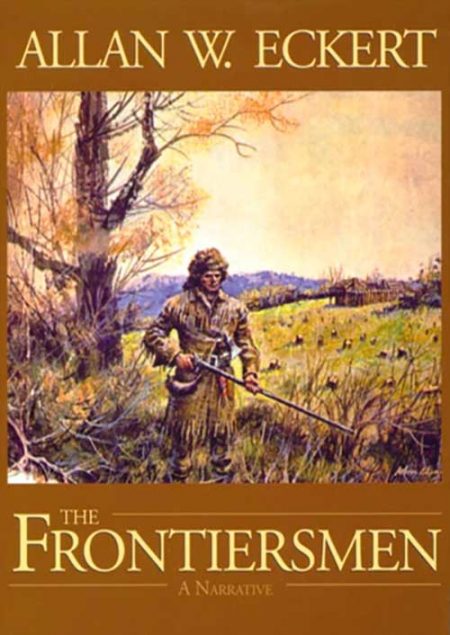 The Winning of America Series: Book 1 of 6 The frontiersmen were a remarkable breed of men. They were often rough and illiterate, sometimes brutal and vicious, often seeking an escape in the wilderness of mid-America from crimes committed back east. In the beautiful but deadly country which would one day come to be known as West Virginia, Kentucky, Michigan, Ohio, Indiana, and Illinois, more often than not they left their bones to bleach beside forest paths or on the banks of the Ohio River, victims of Indians who claimed the vast virgin territory and strove to turn back the growing tide of whites. These frontiersmen are the subjects of Allan W. Eckert's dramatic history. Researched for seven years, The Frontiersmen is the first in Eckert's "The Winning of America" series. SOFTBACK & HARDBACK By Allan Eckert
The Winning of America Series: Book 1 of 6 The frontiersmen were a remarkable breed of men. They were often rough and illiterate, sometimes brutal and vicious, often seeking an escape in the wilderness of mid-America from crimes committed back east. In the beautiful but deadly country which would one day come to be known as West Virginia, Kentucky, Michigan, Ohio, Indiana, and Illinois, more often than not they left their bones to bleach beside forest paths or on the banks of the Ohio River, victims of Indians who claimed the vast virgin territory and strove to turn back the growing tide of whites. These frontiersmen are the subjects of Allan W. Eckert's dramatic history. Researched for seven years, The Frontiersmen is the first in Eckert's "The Winning of America" series. SOFTBACK & HARDBACK By Allan Eckert -
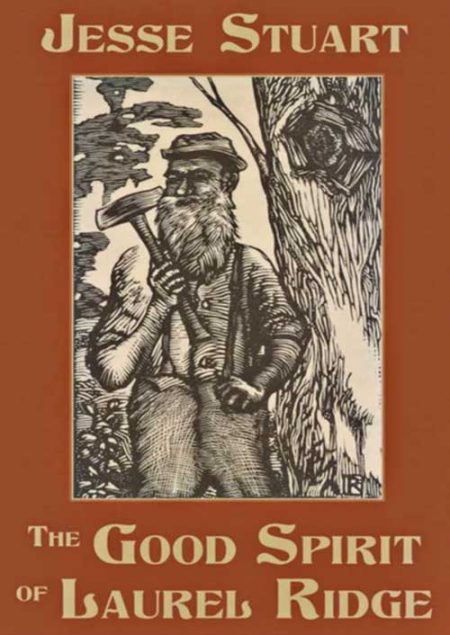 In The Good Spirit of Laurel Ridge, Jesse Stuart provides a tale of the Kentucky hill country which constantly excites, amuses, and amazes. The central character of this book is Theopolis Akers, "Old Opp" to his friends, the hermit of Laurel Ridge who is recognized as one of Stuart's most colorful character creations. Hermit, squatter, steadfast believer in the world of the spirits (sperets, he calls them), "Old Opp" lives a simple life atop deserted Laurel Ridge. He spends his days tilling his small patch of corn, gathering roots and nuts, or fishing with his bow and arrow. By night he sits on his porch, chews calmus weed, and listens to the wind blowing through the horse-hair harp strung up on the cabin wall. If he wants company, there is always his hound dog to talk to or various spirits to commune with including his dead wife, Beadie. By Jesse Stuart
In The Good Spirit of Laurel Ridge, Jesse Stuart provides a tale of the Kentucky hill country which constantly excites, amuses, and amazes. The central character of this book is Theopolis Akers, "Old Opp" to his friends, the hermit of Laurel Ridge who is recognized as one of Stuart's most colorful character creations. Hermit, squatter, steadfast believer in the world of the spirits (sperets, he calls them), "Old Opp" lives a simple life atop deserted Laurel Ridge. He spends his days tilling his small patch of corn, gathering roots and nuts, or fishing with his bow and arrow. By night he sits on his porch, chews calmus weed, and listens to the wind blowing through the horse-hair harp strung up on the cabin wall. If he wants company, there is always his hound dog to talk to or various spirits to commune with including his dead wife, Beadie. By Jesse Stuart -
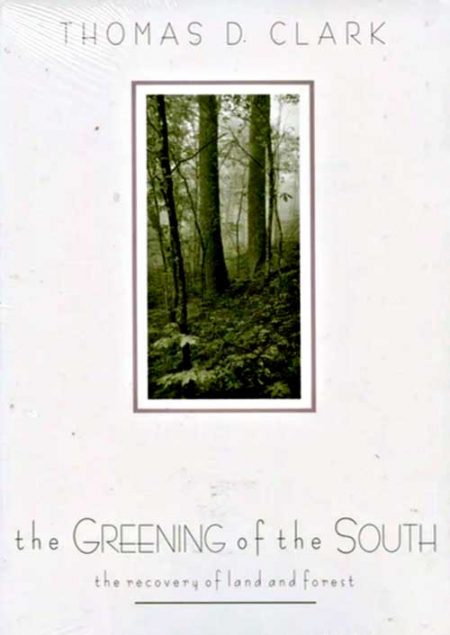 The region that ultimately became and remains today the South was originally a land of forests. Most of the species of trees that were native to North America flourished in the the South. For more than three centuries after the coming of the white man the southern forests gave way to agriculture and to the ravages of the lumber industry. But in the twentieth century, and largely since World War II, southerners and their industries have turned to controlled forestry and tree farming as being among the region’s most rewarding enterprises. Thus the recent decades have seen a remarkable new “greening of the South” By Thomas D. Clark
The region that ultimately became and remains today the South was originally a land of forests. Most of the species of trees that were native to North America flourished in the the South. For more than three centuries after the coming of the white man the southern forests gave way to agriculture and to the ravages of the lumber industry. But in the twentieth century, and largely since World War II, southerners and their industries have turned to controlled forestry and tree farming as being among the region’s most rewarding enterprises. Thus the recent decades have seen a remarkable new “greening of the South” By Thomas D. Clark -
 The Hunters of Kentucky: A Narrative History of America’s First Far West, 1750-1797 covers a wide range of frontier existence, from daily life and survival to wars, exploits, and even flora and fauna. The pioneers and their lives are profiled in biographical sketches, giving a rich sampling of the personalities involved in the United States' westward expansion. Author Ted Franklin Belue's colorful, vivid prose brings these long-forgotten frontiersmen to life. HARDBACK VERSION By Ted Franklin Belue
The Hunters of Kentucky: A Narrative History of America’s First Far West, 1750-1797 covers a wide range of frontier existence, from daily life and survival to wars, exploits, and even flora and fauna. The pioneers and their lives are profiled in biographical sketches, giving a rich sampling of the personalities involved in the United States' westward expansion. Author Ted Franklin Belue's colorful, vivid prose brings these long-forgotten frontiersmen to life. HARDBACK VERSION By Ted Franklin Belue -
Out of stock
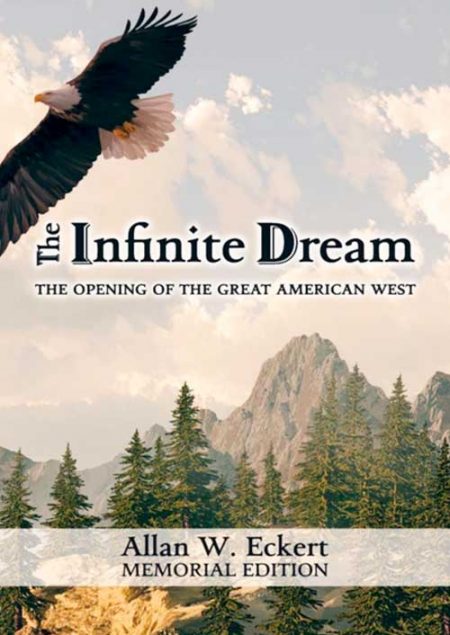 Winning of the West: Book 2 The Infinite Dream: The Opening of the Great American West, told with all the historical detail which made Allan W. Eckert famous, explores America’s westward expansion beyond the Mississippi River, 1834-1848. In this period before the Civil War, restless pioneers were casting eager eyes on the lands between the Mississippi River and the Pacific Ocean. HARDBACK By Allan Eckert
Winning of the West: Book 2 The Infinite Dream: The Opening of the Great American West, told with all the historical detail which made Allan W. Eckert famous, explores America’s westward expansion beyond the Mississippi River, 1834-1848. In this period before the Civil War, restless pioneers were casting eager eyes on the lands between the Mississippi River and the Pacific Ocean. HARDBACK By Allan Eckert



